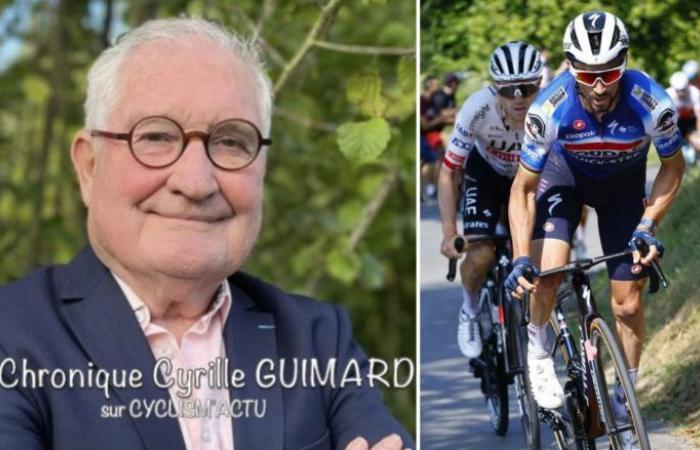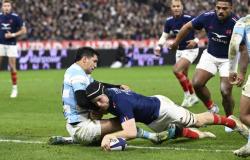
The 2024 season is over… and the 2025 season is fast approaching. The opportunity to find Cyrille Guimard – former sports director and coach of the France team – for his usual column at Cyclism’Actu. The results of the season, the domination of Tadej Pogacar andUAE Team Emiratesthe journey of Tour de France 2025the transfer window, increasingly exorbitant contracts… “the Druid” discussed all of these topics and more in the interview to watch and/or read below.
Video – The Cyrille Guimard Chronicle… for Cyclism'Actu
“Tadej Pogacar dominated the season from start to finish”
What do you remember from this season?
Well, the first thing is that Tadej Pogacar dominated from start to finish, with absolutely extraordinary control. We have another character who also mastered the start of the season, Mathieu van der Poel. And then the French awakening at the start of the year, with a certain number of refreshing victories, to the extent that, even if for the most part it was not the big WorldTour events, it's always good to win, that makes you want to start again, it gives confidence on a personal level, but also on a collective level. I also want to say thank you to the pro teams for having done what was necessary to ensure that the French were ready for the Olympic Games, with these 2nd and 3rd places, which are still quite extraordinary.
If we come back a little to Tadej Pogacar's domination, it is not only his domination, but that of the entire UAE Team Emirates team. Is the UAE season in 2024 better than Jumbo-Visma in 2023?
It's difficult… The 3 Grand Tours, a complete podium on one of them, for the Jumbo-Visma, no one had ever done it before. But things are going very quickly today, to memorize what happened a year or two ago, you almost have to go look for the archives. And this domination of UAE takes second place the feat of Jumbo-Visma last year. There are always explanations, we are not one year above everyone else and the next year bad. I think that, first of all, there was the serious fall in the Basque Country with Jonas Vingegaard, Remco Evenepoel… These two riders still had an influence on the course of the season which followed, which perhaps also be a little favored UAE.
And when the leader flutters, the teammates flutter. When you have a great leader, you have great teammates. These same teammates in another team without a great leader, take away 20% from you. Collective motivation is something extraordinary. And I was lucky enough to experience this kind of episodes, go back to the 1984 Tour de France and you will understand what I mean, we still won 10 stages, making 1 and 3 in the general classification. When there is this euphoria of victory, it's winning, it's logical, it's normal. And it's all the more logical since it's the team with the biggest budget and which consequently has the best riders, the best young people… Now, is this going to last a long time or not ? That's another subject. But it is not abnormal for UAE to dominate two in this way today, taking into account the elements that I have just provided.
“The route of the 2025 Tour? It’s not the route that makes the race”
The 2025 Tour de France route has been revealed. What do you think?
It's good to think a lot about the course, except you have no control over the race. We know that it is not the course that makes the race, it is the runners who will adapt to the type of course. And the more difficult a course is, the more reserved the riders are, the team strategists also control as much as possible those who could put them in danger through not very well thought out offensives. Any route that is too difficult blocks the race. But we can realize that the Tour is played over 3 or 4 stages, not over 21. Except that each stage is one of the elements of the puzzle, which will allow the decision to be made at some point. Can we be satisfied with the course? Yes, because, a priori, we have the feeling that it is balanced. We'll talk about it again when the Tour finishes.
Who is this course best suited to? And in the end, in his 2024 form, regardless of the route, will he suit Tadej Pogacar?
It always suits the strongest. When I was sports director, I started looking at the course three weeks before the Tour, not before. Because you have a first view on the day of the presentation. Then, six months before, you know which riders you are going to select, but three months later you have a third out. They say it's a journey for Pogacar, for Vingegaard… but will they be at the start? So what's the point of making scenarios when you don't even know who the actors are? And what state will the actors be in?
“Lenny Martinez leaving for Bahrain Victorious…”
Let's talk a little about the transfer window, which was a little calmer than last year. Which transfers stood out to you?
I find that we don't talk about it a lot, but it's that of Julian Alaphilippe at Tudor. He leaves for a team that is not WorldTour, accompanied by Marc Hirschi, who was the best rider over the last two months of the season. That’s an interesting transfer window. They are far from the WorldTour, but they will try to go there and have made an XXL recruitment. And that seems very interesting to me. For the rest of all transfers. It's relatively quiet. Remember, a year ago, it was teams merging, others buying out. We were far from the tranquility and serenity of this year.
There is also Lenny Martinez, who is interesting to follow because he is leaving for Bahrain Victorious, a team which is not necessarily in phase with our culture and perhaps even simply that of the Martinez, who have a certain culture , a certain idea of what Cycling is, whether with the dad, the uncle, the grandfather… How will he adapt in this world? I'm not too scared for him, but it's still something that's going to be interesting. Going to a team whose real culture is difficult to understand, which is a bit behind the scenes… because Bahrain Victorious is not the team we dream of today. Maybe Lenny will be able to make us dream of this team, but it will be difficult in my opinion.
We hear about increasingly exorbitant figures in cycling, with salaries of 8 or 10 million per year, and contracts over 5 or 6 seasons, for ever younger riders. How do you assess this trend?
This is a development that we started to see a few years ago. At one time, we signed contracts for two-year youngsters. And I am well placed to talk about it, since the first contract to exist was me who made it, at the time when I was president of the riders' union. So the two-year obligation for neo-pros has been retained. Then, over the years, things have evolved, and so have budgets. And then we have the Arab teams which have arrived, competitions which have also appeared there. And here we arrive today with teams which do not have a fixed budget, they have the necessary budget to make the best team, so they have the possibility of making long-term contracts with remuneration which is at the height of the talent of the runners. But it doesn't shock me. I don't know the clauses, but there must be exit clauses on one side or the other. You don't get married for life without the possibility of getting out.
“Do sports directors still exist today?”
Personally, in this world of cycling in 2024, where there is more and more money, where young people are recruited earlier and earlier… would you like to be manager of a team or sports director?
First of all, do sports directors still exist today? Now, in the car, you have people who are called sports directors, but who are mainly people who communicate on the radio. Before, a sports director was the boss of the team. Today, when you take a professional runner, he has at least seven references in his team. Seven referents with whom he will have different relationships. He has the sports director, the coach, the psychologist, the mental trainer, the masseur, the dietitian… The runner no longer has just one boss in a team, but six, seven or eight. Especially since depending on the races, you almost never have the same sports director, or very few. 40 or 50 years ago, organizational charts were very clear and simple. Things are much more complicated because, in addition, above you have a general manager, again with different responsibilities. In the teams I managed, we were less than 50, whereas now we are at 150, it's a real undertaking. So we can no longer look at things the same way.
I think that today, being a cyclist doesn't always have to be very fun. And then there is a consequence of all this, it is the number of runners who burn out. In 25 years, we had two or three runners who suffered burnout, that's all. Today, it's three or four per year. So we don't have a very good handle on things.





